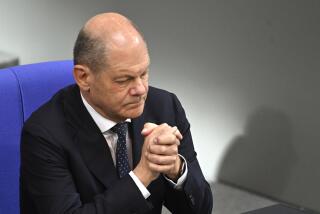Accord Reached on German Unity Treaty : Reunification: The document still requires ratification. It deals with a broad range of subjects, including the emotionally charged issue of abortion.
- Share via
BONN — After a week of roller-coaster negotiations, the two Germanys early today initialed a treaty setting conditions for their Oct. 3 political unification.
The treaty, which constitutes the final important piece of legislation between the two Germanys on their internal aspects of unity, is scheduled to be signed later today in East Berlin.
It must be ratified by both German parliaments before unification occurs.
Agreement on the treaty, which deals with a broad spectrum of subjects ranging from education and finance to local government administration, has been held up by prolonged, sometimes heated, attempts by West Germany’s major political parties to find a compromise on an abortion law for a united Germany.
While negotiators had worked through a series of complex issues involved in merging East Germany’s highly centralized, former Communist political system with its democratic West German counterpart, they ran aground in their attempts to reconcile sharply conflicting abortion laws.
West German Chancellor Helmut Kohl’s Christian Democrat-led coalition had hoped to complete talks last week.
East Germany’s former Communist government enacted a de facto abortion-on-demand law in the early 1970s, while an emotional national debate in West Germany a few years later left the country with strict abortion-by-exception legislation that still remains on the books.
All major parties in both Germanys agreed at an early stage in the talks that both laws should remain in force during an interim period until new, all-German legislation can be drafted by a united German Parliament.
However, they were deeply divided over how the two laws should be applied.
In a significant concession, Kohl’s Christian Democrats seemed to pave the way for agreement Wednesday by dropping their insistence that a woman’s residence be the determining factor--a principle criticized by feminist groups as highly discriminatory because it meant that West German women who obtained an abortion in what is now East Germany would be subject to criminal prosecution, while East German women would be exempt.
The opposition Social Democrats, whose support is required for the necessary two-thirds majority for parliamentary ratification and who had insisted that this provision be scrapped, seemed ready to back the treaty.
However, within hours, a new dispute erupted between the West German parties over the length of the period during which the two laws should be permitted to exist parallel to each other.
The Christian Democrats wanted to ensure that tougher West German legislation applied to all of a united Germany if there were no consensus for a new law within two years. But this was rejected by the Social Democrats, who wanted a five-year interim period, with no commitment to extend existing West German legislation.
Kohl’s party, along with its Bavarian sister organization, the Christian Socialists, draw much of their support from the Roman Catholic southern and southwestern parts of Germany.
At a midnight press conference, the party leaders agreed on the two-year limit but dropped any reference to the subsequent preeminence of the tougher West German law.
The Social Democrats, together with a majority of West German members of Parliament, in recent years have become disillusioned with the ineffectiveness of criminal prosecution in halting abortion and instead now talk of including the issue in a larger legislative package that would deal with support for pregnant women and mothers.
“We can speak of a real breakthrough,” said Social Democrat Oskar Lafontaine, a candidate for chancellor.
As the abortion dispute tied the West German side in knots in Bonn, the East German Parliament in East Berlin briefly placed today’s signing in doubt when it overwhelmingly rejected plans Thursday to ship about 6 million files maintained by the Communist Ministry for State Security--the secret police, known as the Stasi--to the West German National Archive in Koblenz.
With only two opposing votes, the Volkskammer overturned the selection of Koblenz, which had been approved by a team of East and West German negotiators, and demanded that the files be distributed to regional East German centers and be made accessible to the individuals concerned.
A hastily arranged compromise will place the files in the hands of a trustee and leave the final decision on their location to an all-German Parliament.
The first all-German election since the early 1930s is scheduled for Dec. 2.
More to Read
Sign up for Essential California
The most important California stories and recommendations in your inbox every morning.
You may occasionally receive promotional content from the Los Angeles Times.










